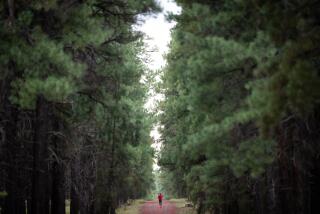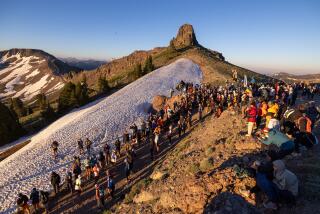Every Bodyâs Talking . . . If Heâd Only Listened
Listen to your body.
Iâve heard that phrase a lot during my months of training for the March 5 Los Angeles Marathon--my first attempt at any kind of distance running. The coach of the L.A. Roadrunners club, with whom Iâm training, preaches it. My fellow runners toss it around. And itâs always popping up in those running magazines Iâve been flipping through at newsstands.
For my first four months of training, which I began in August, I didnât pay much attention to it. I stuck to the training regimen and gradually felt myself gaining strength and endurance.
In the last several weeks, however, Iâve been doing some listening. In fact, my body and I have been carrying on a regular dialogue.
The conversation started the Saturday before Christmas. We Roadrunners went out for what was then our longest run--18 miles in Venice and Santa Monica. It was a beautiful day and, with about three miles to go, I felt good. I picked up the pace, lengthened my stride and pulled away from the group.
With just a mile to go, my legs tightened up. But I wouldnât hear of giving in. I kept running hard and felt proud of myself as I reached the finish. You the man!
*
Two hours later my body registered its opinion--a tongue-lashing that felt like sharp darts shooting through my legs, hitting bullâs eyes in my knees and ankles. Its message was loud and clear: You the fool!
I was reminded of the lecture that Pat Connelly, the Roadrunnersâ coach, delivered to us early in our training. It went something like this: âWhen youâre running a distance you havenât run before, itâs not a good idea to put on a big sprint at the finish. Thatâs when your body is fatigued and you can hurt yourself. Maintain your pace. Maintain your stride. When you finish, you should feel like you still have something left.â
OK, so I forgot.
When the pain in my joints continued for the next few days, I decided to take a little break and rest my 39-year-old bones.
Now, this decision also came at a time when my motivation to get up before dawn for my three weekday-morning runs was lagging severely, anyway. Some sort of hibernation thing was kicking in, and all I wanted to do was stay in bed until the latest possible hour.
Except for an easygoing, 45-minute jog during Christmas week and another just before New Yearâs, I took the holiday weeks off from running.
I slept as much as I could. I ate lots of candy. I stuffed myself at holiday meals and parties.
It was just what I needed. The pains in my legs subsided, and I started off the new year with a strong urge to get back out there and pick up where Iâd left off.
Then, pow! Something popped in my left heel.
While visiting a friend in San Diego, I figured Iâd get my miles in at one of my favorite places--Sunset Cliffs. But as I came down a hill, enjoying the scenery, that shot of pain stopped me in my tracks.
I walked for a couple of blocks and tried running on it again. Surprisingly, it didnât hurt that much, and I was able to last another mile or so back to my friendâs house.
But the next morning, as I got out of bed, the pain was severe. This was not the usual muscle soreness. This was something to be concerned about.
I went to my HMO, got an X-ray (which showed no fractures or bone damage) and a referral to a podiatrist. It took a few days for the referral to be processed and to get an appointment for the next week. In the meantime, the pain, centered in the front of my heel, was intermittent.
It would hurt as I got out of bed in the morning. But when I tried running on it, the pain would subside. At work, as I walked down the street, Iâd start limping again.
*
I finally got to the podiatrist and described this mysterious condition in great detail. It was no mystery to her.
I have a very common condition known as plantar fasciitis. Itâs not serious. People who suddenly increase their activity level--like training for their first marathon--often experience it.
According to a fact sheet I got at the doctorâs, thereâs a strap-like structure on the bottom of your foot called the plantar fascia that runs the length of your arch, from your heel bone to your toes. Itâs not very stretchable, and when you repeatedly put too much stress on it, it can tear or pull away from the heel bone.
Itâs often more painful in the morning or after a long rest because the plantar fascia, when inflamed, tends to contract during inactivity.
But why did it happen when it happened? Maybe the recent increase in mileage. Maybe I hadnât stretched enough before the run. Or maybe it was the shoes.
A physical therapist in the podiatry unit examined my running shoes, which Iâd brought with me. She pointed out how areas around the arch and heel had started to break down.
âYou need new shoes,â she said.
Really? But Iâd just bought this pair in September. They couldnât be worn out yet.
After some calculations, however, I discovered that theyâd taken a beating from my 190-pound body for more than 400 miles.
I bought new running shoes. Theyâre fitted with insoles that give my arches better support. At work, Iâm wearing walking shoes also fitted with arch supports.
In the morning and evening I do a series of stretches, which seem to help. Iâm not feeling the pain I felt before.
The best medicine, of course, will be rest. A few weeksâ worth.
But I canât stop now. I need to keep up my training--including a 30-kilometer race on an upcoming Saturday--to get ready. All the while, Iâll be more sensitive to what my body is telling me.
With less than five weeks to go before I step onto the Los Angeles Marathonâs 26.2-mile course:
Iâm still running.
And listening.
*
Information on the Los Angeles Marathon is available at https://www.lamarathon.com.
* Previous articles in this series are on The Timesâ Web site at http://ukobiw.net./intraining.


